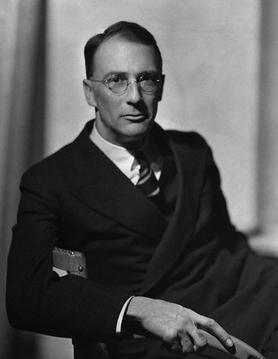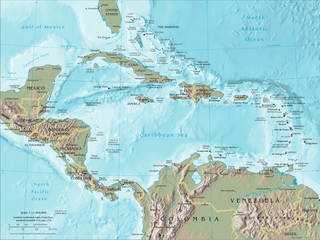The Caribbean , sometimes also called the West Indies lies between the continental North and South America. See History of the Caribbean.
Contents
Caribbean may also refer to:
The Caribbean , sometimes also called the West Indies lies between the continental North and South America. See History of the Caribbean.
Caribbean may also refer to:

Cecil Louis Troughton Smith, known by his pen name Cecil Scott "C. S." Forester, was an English novelist known for writing tales of naval warfare, such as the 12-book Horatio Hornblower series depicting a Royal Navy officer during the Napoleonic wars. The Hornblower novels A Ship of the Line and Flying Colours were jointly awarded the James Tait Black Memorial Prize for fiction in 1938. His other works include The African Queen and The Good Shepherd.
Indian or Indians may refer to:

Charlotte Amalie, located on St. Thomas, is the capital and the largest city of the United States Virgin Islands. It was founded in 1666 as Taphus. In 1691, the town was renamed to Charlotte Amalie after Charlotte Amalie of Hesse-Kassel (1650–1714), queen consort to King Christian V of Denmark-Norway. It has a deep-water harbor that was once a haven for pirates and is now one of the busiest ports of call for cruise ships in the Caribbean, with about 1.5 million-plus cruise ship passengers landing there annually. Protected by Hassel Island, the harbor has docking and fueling facilities, machine shops, and shipyards and was a U.S. submarine base until 1966. The Town has been inhabited for centuries. When Christopher Columbus arrived in 1493, the area was inhabited by Caribs, Arawaks, Ciboney and Taíno native peoples. It is on the southern shore at the head of Saint Thomas Harbor. In 2010 the City had a population of 18,481, which makes it the largest city in the Virgin Islands Archipelago. Hundreds of ferries and yachts pass by the Town each week.

The era of piracy in the Caribbean began in the 1500s and phased out in the 1830s after the navies of the nations of Western Europe and North America with colonies in the Caribbean began combating pirates. The period during which pirates were most successful was from the 1660s to 1730s. Piracy flourished in the Caribbean because of the existence of pirate seaports such as Port Royal in Jamaica, Tortuga in Haiti, and Nassau in the Bahamas. Piracy in the Caribbean was part of a larger historical phenomenon of piracy, as it existed close to major trade and exploration routes in almost all the five oceans.

Port Royal is a town located at the end of the Palisadoes, at the mouth of Kingston Harbour, in southeastern Jamaica. Founded in 1494 by the Spanish, it was once the largest city in the Caribbean, functioning as the centre of shipping and commerce in the Caribbean Sea by the latter half of the 17th century. It was destroyed by an earthquake on 7 June 1692, which had an accompanying tsunami, leading to the establishment of Kingston, which is now the largest city in Jamaica. Severe hurricanes have regularly damaged the area. Another severe earthquake occurred in 1907.

Bartholomew Roberts, born John Roberts, was a Welsh pirate and the most successful pirate of the Golden Age of Piracy, taking over 400 prizes in his career. Roberts raided ships off the Americas and the West African coast between 1719 and 1722; he is also noted for creating his own Pirate Code, and adopting an early variant of the Skull and Crossbones flag.

Tortuga Island is a Caribbean island that forms part of Haiti, off the northwest coast of Hispaniola. It constitutes the commune of Île de la Tortue in the Port-de-Paix arrondissement of the Nord-Ouest department of Haiti.
Chutney music is a fusion genre of Indian folk music, specifically Bhojpuri folk music, with local Caribbean calypso and soca music, and later on Bollywood music. This genre of music that developed in Trinidad and Tobago is popular in Trinidad and Tobago, Guyana, Suriname, Jamaica, other parts of the Caribbean, Fiji, Mauritius, and South Africa. Chutney music emerged mid-20th century and reached a peak of popularity during the 1980s. Several sub-genres have developed.
Indo-Caribbean or Indian-Caribbean people are Indian people in the Caribbean who are descendants of the Jahaji Indian indentured laborers brought by the British, Dutch, and French during the colonial era from the mid-19th century to the early 20th century. A minority are descendants of Indians or other South Asians who immigrated as entrepreneurs, businesspeople, merchants, engineers, doctors, and other professional occupations beginning in the mid-20th century.
A monarch is a ruler in a system (monarchy) where succession is hereditary.
An empress is a female imperial monarch, or the wife of an imperial monarch; written with a capital, Empress is used as the title of an empress, placed before her name – often just the given name.
Pirates of the Caribbean is a Disney media franchise encompassing numerous theme park rides, a series of films, and spin-off novels, as well as a number of related video games and other media publications. The franchise originated with Walt Disney's theme park ride of the same name, which opened at Disneyland in 1967 and was one of the last Disneyland attractions overseen by Walt Disney. Disney based the ride on pirate legends, folklore and novels, such as those by Italian writer Emilio Salgari.

In English-speaking popular culture, the modern pirate stereotype owes its attributes mostly to the imagined tradition of the 18th century Caribbean pirate sailing off the Spanish Main and to such celebrated 20th century depictions as Captain Hook and his crew in the theatrical and film versions of J. M. Barrie's children's book Peter Pan, Robert Newton's portrayal of Long John Silver in the 1950 film adaptation of the Robert Louis Stevenson novel Treasure Island, and various adaptations of the Middle Eastern pirate, Sinbad the Sailor. In these and countless other books, films, and legends, pirates are portrayed as "swashbucklers" and "plunderers". They are shown on ships, often wearing eyepatches or peg legs, having a parrot perched on their shoulder, and saying phrases like "Arr, matey" and "Avast, me hearty". Pirates have retained their image through pirate-themed tourist attractions, film, toys, books and plays.

Swashbuckler films are a subgenre of the action film genre, characterised by swordfighting and adventurous heroic characters, known as swashbucklers. Morality is typically clear-cut, where heroic characters are clearly virtuous, whereas villains often follow a code of honour as well. Some swashbuckler films have romantic elements, most frequently a damsel in distress. Real historical events often feature prominently in the plot.

The Swinging Bridge is a novel by Ramabai Espinet, published in 2003 by HarperCollins Publishing. In 2004, the novel was short-listed for the Commonwealth Writers' Prize in the category of Best First Book. Espinet's novel focuses on a multi-generational Indo-Trinidadian family living in Canada, touching on a number of themes and topics such as gender identity and matrilineal ties.

Sir Henry Morgan was a Welsh pirate, privateer and buccaneer. He made himself famous during activities in the Caribbean, primarily raiding Spanish settlements. He earned a reputation as one of the most notorious and successful privateers in history, and one of the most ruthless among those active along the Spanish Main.